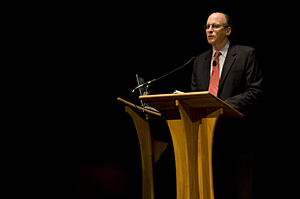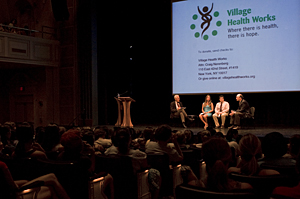

ADVERTISEMENT
- Rozovsky wins prestigious NSF Early Career Award
- UD students meet alumni, experience 'closing bell' at NYSE
- Newark Police seek assistance in identifying suspects in robbery
- Rivlin says bipartisan budget action, stronger budget rules key to reversing debt
- Stink bugs shouldn't pose problem until late summer
- Gao to honor Placido Domingo in Washington performance
- Adopt-A-Highway project keeps Lewes road clean
- WVUD's Radiothon fundraiser runs April 1-10
- W.D. Snodgrass Symposium to honor Pulitzer winner
- New guide helps cancer patients manage symptoms
- UD in the News, March 25, 2011
- For the Record, March 25, 2011
- Public opinion expert discusses world views of U.S. in Global Agenda series
- Congressional delegation, dean laud Center for Community Research and Service program
- Center for Political Communication sets symposium on politics, entertainment
- Students work to raise funds, awareness of domestic violence
- Equestrian team wins regional championship in Western riding
- Markell, Harker stress importance of agriculture to Delaware's economy
- Carol A. Ammon MBA Case Competition winners announced
- Prof presents blood-clotting studies at Gordon Research Conference
- Sexual Assault Awareness Month events, programs announced
- Stay connected with Sea Grant, CEOE e-newsletter
- A message to UD regarding the tragedy in Japan
- More News >>
- March 31-May 14: REP stages Neil Simon's 'The Good Doctor'
- April 2: Newark plans annual 'wine and dine'
- April 5: Expert perspective on U.S. health care
- April 5: Comedian Ace Guillen to visit Scrounge
- April 6, May 4: School of Nursing sponsors research lecture series
- April 6-May 4: Confucius Institute presents Chinese Film Series on Wednesdays
- April 6: IPCC's Pachauri to discuss sustainable development in DENIN Dialogue Series
- April 7: 'WVUDstock' radiothon concert announced
- April 8: English Language Institute presents 'Arts in Translation'
- April 9: Green and Healthy Living Expo planned at The Bob
- April 9: Center for Political Communication to host Onion editor
- April 10: Alumni Easter Egg-stravaganza planned
- April 11: CDS session to focus on visual assistive technologies
- April 12: T.J. Stiles to speak at UDLA annual dinner
- April 15, 16: Annual UD push lawnmower tune-up scheduled
- April 15, 16: Master Players series presents iMusic 4, China Magpie
- April 15, 16: Delaware Symphony, UD chorus to perform Mahler work
- April 18: Former NFL Coach Bill Cowher featured in UD Speaks
- April 21-24: Sesame Street Live brings Elmo and friends to The Bob
- April 30: Save the date for Ag Day 2011 at UD
- April 30: Symposium to consider 'Frontiers at the Chemistry-Biology Interface'
- April 30-May 1: Relay for Life set at Delaware Field House
- May 4: Delaware Membrane Protein Symposium announced
- May 5: Northwestern University's Leon Keer to deliver Kerr lecture
- May 7: Women's volleyball team to host second annual Spring Fling
- Through May 3: SPPA announces speakers for 10th annual lecture series
- Through May 4: Global Agenda sees U.S. through others' eyes; World Bank president to speak
- Through May 4: 'Research on Race, Ethnicity, Culture' topic of series
- Through May 9: Black American Studies announces lecture series
- Through May 11: 'Challenges in Jewish Culture' lecture series announced
- Through May 11: Area Studies research featured in speaker series
- Through June 5: 'Andy Warhol: Behind the Camera' on view in Old College Gallery
- Through July 15: 'Bodyscapes' on view at Mechanical Hall Gallery
- More What's Happening >>
- UD calendar >>
- Middle States evaluation team on campus April 5
- Phipps named HR Liaison of the Quarter
- Senior wins iPad for participating in assessment study
- April 19: Procurement Services schedules information sessions
- UD Bookstore announces spring break hours
- HealthyU Wellness Program encourages employees to 'Step into Spring'
- April 8-29: Faculty roundtable series considers student engagement
- GRE is changing; learn more at April 15 info session
- April 30: UD Evening with Blue Rocks set for employees
- Morris Library to be open 24/7 during final exams
- More Campus FYI >>
3:33 p.m., Sept. 2, 2010----Salvador Dali titled one of his most famous works The Persistence of Memory.
In the acclaimed nonfiction work Strength in What Remains, Pulitzer Prize-winning author Tracy Kidder notes that the persistent force of memory became both a burden and an inspiration for the book's protagonist, Deogratias.
A Burundian refugee who survived the nightmare of civil war by escaping to the United States, Deo, as he is called in the book, eventually returns to his native land to provide basic health care in a country where hope and people often seem abandoned.
Kidder related his experiences in meeting Deo and writing the book during a talk to a standing-room-only crowd of more than 650 freshman students and members of the UD community on Wednesday, Sept. 1, in Mitchell hall.
Published by Random House, Strength in What Remains is the University's 2010 First Year Common Reader, a program that affords freshmen the opportunity to share in the intellectual life of the campus community.
Deo began his journey as a 22-year-old who survived the decades-long, hate-fueled conflict between the Hutus and Tutsis, an ethnic war that began in Rwanda in the mid-1960s and spread to Burundi, where hundreds of thousands have since died in bloody massacres.
A Tutsi who was working as an intern in a rural hospital, Deo fled to Rwanda in 1994 to escape the violence touched off by the assassination of Burundian President Melchior Ndadaye, a Hutu, in an attempted coup by Tutsi soldiers one year earlier.
Deo lived to escape through a twist of fate when the building in which he was staying was searched. “Deo survived because he left the door to his room open,” Kidder told his UD audience. “The men who would have killed him thought he had already escaped.”
Kidder first met Deo when he and his wife visited Paul Farmer, the subject of his previous book, Mountains Beyond Mountains (2003), who was then recovering from knee surgery.
What piqued Kidder's interest was the young man's recounting of the time when he was homeless in New York -- a city where power and money often seem to be the most prized commodities.
“I learned that he had survived in New York City by sleeping under a bush in Central Park during the night and delivering groceries during the day, and that when on such a delivery he met Sharon, an ex-nun who heard his story and set out to find him a home,” Kidder said. “He was adopted by a couple who were not wealthy but took a chance and took him in, and eventually paid for his enrollment into Columbia University's School of General Studies.”
Kidder said that he couldn't imagine himself in that situation, being subject to the pity of strangers. He also said he hoped he would never again look over the many anonymous people who inhabit New York City -- those who do all sorts of jobs by day and spend their nights sleeping in the city's parks and doorways.
Kidder also explained why he chose to begin the book with the American portion of Deo's story, before taking the reader back into the hell from which Deo had barely escaped. “The first half of the book is his memory, in my words,” Kidder said. “I began to realize that a large part of this book was about memory and how we have to learn to deal with the torment of our memories.”
When Deo returned to Burundi in 2005, he found things worse than he could remember. Now an American citizen, he dropped out of Dartmouth Medical School a year later to realize his dream of building a medical clinic, the Village Health Works, in his native country.
Author fields questions
After his remarks, Kidder fielded questions from UD students read by a panel that included Ralph Begleiter, UD's Edward and Elizabeth Goodman Rosenberg Professor of Communication, Distinguished Journalist in Residence and director of the Center for Political Communication; Hailey Desser, a junior accounting major; and Martin Martinez, a sophomore majoring in international relations with a concentration in development and also Latin American Studies.
When asked why Deo made the decision to return to Burundi, Kidder said that despite all that happened, he feels the country has given him many things, and he still has a lot of family there.
“I think he is happy to be an American citizen, but he also is a brave person and is not afraid to go back to Burundi,” Kidder said. “I think he feels doing this is his life. He has every right to live a good life in America, but he chose to go back. I respect him for that.”
Kidder also was asked to address the role that education played in Deo's personal journey from homelessness to establishing a health clinic in Burundi.
“He wanted to understand what had happened to him, so he studied philosophy,” Kidder said. “Education was a great refuge for him. I think Columbia saved his life. His mind came to rest and he could see things from a distance, in Manichean terms of good and evil.”
Article by Jerry Rhodes
Photos by Tyler Jacobson


